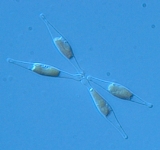
Phaeodactylum tricornutum
Encyclopedia
Phaeodactylum tricornutum is a diatom
. It is the only species in the genus Phaeodactylum. Unlike other diatoms P. tricornutum can exist in different morphotypes (fusiform, triradiate, and oval), and changes in cell shape can be stimulated by environmental conditions. This feature can be used to explore the molecular basis of cell shape control and morphogenesis. Unlike most diatoms P. tricornutum can grow in the absence of silicon, and the biogenesis of silicified frustules is facultative. This provides opportunities for experimental exploration of silicon-based nanofabrication in diatoms.
Another peculiarity is that during asexual reproduction the frustules do not appear to decrease in size. This allows continuous culture without the need for sexual reproduction. In fact it is unknown if P. tricornutum is capable of sexual reproduction. To date no substantial evidence has been found to support sexual reproduction in a laboratory or other setting. Despite the fact that P. tricornutum can be considered an atypical pennate diatom it is one of the main diatom model species. A transformation protocol has been established and RNAi vectors are available. This greatly facilitates molecular genetic studies.
sequenced (the other being Thalassiosira pseudonana
). The genome contains approximately 10% prokaryote like genes, a unusually large proportion. Over 30000 expressed sequence tags (ESTs) have been organized into the Diatom EST Database.
Diatom
Diatoms are a major group of algae, and are one of the most common types of phytoplankton. Most diatoms are unicellular, although they can exist as colonies in the shape of filaments or ribbons , fans , zigzags , or stellate colonies . Diatoms are producers within the food chain...
. It is the only species in the genus Phaeodactylum. Unlike other diatoms P. tricornutum can exist in different morphotypes (fusiform, triradiate, and oval), and changes in cell shape can be stimulated by environmental conditions. This feature can be used to explore the molecular basis of cell shape control and morphogenesis. Unlike most diatoms P. tricornutum can grow in the absence of silicon, and the biogenesis of silicified frustules is facultative. This provides opportunities for experimental exploration of silicon-based nanofabrication in diatoms.
Another peculiarity is that during asexual reproduction the frustules do not appear to decrease in size. This allows continuous culture without the need for sexual reproduction. In fact it is unknown if P. tricornutum is capable of sexual reproduction. To date no substantial evidence has been found to support sexual reproduction in a laboratory or other setting. Despite the fact that P. tricornutum can be considered an atypical pennate diatom it is one of the main diatom model species. A transformation protocol has been established and RNAi vectors are available. This greatly facilitates molecular genetic studies.
Gene Sequencing
Phaeodactylum tricornutum is one of two diatoms to have its genomeGenome
In modern molecular biology and genetics, the genome is the entirety of an organism's hereditary information. It is encoded either in DNA or, for many types of virus, in RNA. The genome includes both the genes and the non-coding sequences of the DNA/RNA....
sequenced (the other being Thalassiosira pseudonana
Thalassiosira pseudonana
Thalassiosira pseudonana is a species of marine centric diatom. It was chosen as the first eukaryotic marine phytoplankton for whole genome sequencing. T...
). The genome contains approximately 10% prokaryote like genes, a unusually large proportion. Over 30000 expressed sequence tags (ESTs) have been organized into the Diatom EST Database.
Distribution
Phaeodactylum ranges from France and Germany in Europe to Nova Scotia in North America.External links
- avesthagen.sznbowler.com Genome Properties of the Diatom Phaeodactylum tricornutum (pdf)
- www.pubmedcentral.gov Growth of and Omega-3 Fatty Acid Production by Phaeodactylum tricornutum under Different Culture Conditions (pdf)
- dbs.clib-jena.mpg.de New Insight into Phaeodactylum tricornutum Fatty Acid Metabolism. Cloning and Functional Characterization of Plastidial and Microsomal 12-Fatty Acid Desaturases (pdf)
- journals.tubitak.gov.tr The Growth of Continuous Cultures of the Phytoplankton Phaeodactylum Tricornutum (pdf)
- http://www.bio.utexas.edu/research/utex/photogallery/o-r/Phaeodactylum_tricornutum_646.htm picture of phaeodactylum tricornutum

